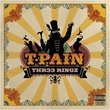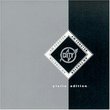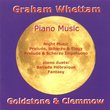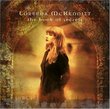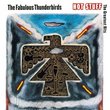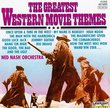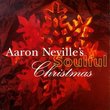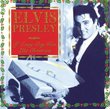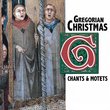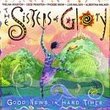| All Artists: Georg Philipp Telemann, Richard Edlinger, Capella Istropolitana Title: Telemann: Recorder Suite in A minor; Viola Concerto; Tafelmusik Members Wishing: 0 Total Copies: 0 Label: Naxos Release Date: 10/27/1993 Genre: Classical Styles: Chamber Music, Forms & Genres, Concertos, Suites, Theatrical, Incidental & Program Music, Historical Periods, Baroque (c.1600-1750), Classical (c.1770-1830), Instruments, Brass, Strings Number of Discs: 1 SwapaCD Credits: 1 UPC: 730099515627 |
Search - Georg Philipp Telemann, Richard Edlinger, Capella Istropolitana :: Telemann: Recorder Suite in A minor; Viola Concerto; Tafelmusik
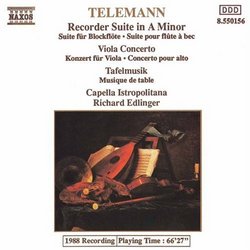 | Georg Philipp Telemann, Richard Edlinger, Capella Istropolitana Telemann: Recorder Suite in A minor; Viola Concerto; Tafelmusik Genre: Classical
|
Larger Image |
CD DetailsSimilar CDsSimilarly Requested CDs
|
CD ReviewsA very skilled recorder recording! Callie | Portland, OR United States | 04/29/2005 (5 out of 5 stars) "Dude, I can't agree with the negative reviews for this recording. The recorder suite doesn't sound choppy or pale. Plus, that claim about "relabling movements" was a complete lie. You can tell yourself just by looking at the cover and track list on the website here. I thought that the recorder and orchestra really blend together very well, authentically and harmonically. Consider the fact that I've been in love with Teleman's recorder music for a very long time. For a long time I've wanted to get a good recording in which the recorder was played with the great skill and technique that both Teleman and I the listener expected. This recording had everything that I wanted and I enjoyed every bit of it. I got this recording for the reocrder suite, but I also enjoyed every bit of the viola and horn concertos. The viola and horn concertos also blend the orchestra and solos with clearly defined skill, creating a beautiful harmonic and melodic sound. It sounds like heaven to me. Are there better recordings than this one? Maybe there are, but that doesn't mean that this recording isn't good at all. Take it from a twenty one year old classical music fan who knows how to enjoy music rather than critique every little thing like those old people do. To me this is a very very good recording of some great baroque music that sounds just as great and beautiful as baroque music is and always was." Leaves me cold Gregory M. Zinkl | Chicago, IL | 01/27/2000 (2 out of 5 stars) "What is wrong with this recording? I'm not sure. The viola soloist is lovely, the violin soloists are also fine. So are the horns and the recorders. Why don't I love this recording? I think it has to do with a pedestrian approach.The viola concerto is the best thing on this disc. It is engaging Telemann, and is well-performed for the most part. The orchestra accompaniment is pretty vanilla, however. A lack of clarity in the orchestra also hinders some of the joy of the Concerto for 3 violins.I guess if I had to sum up my apathy about this disc, I would say that the blame falls on the shoulders of Edlinger and the orchestra. We have come a long way in Baroque playing, but this seems hopelessly average and old-fashioned (not that older styles of Baroque performances don't have their rewards). Such wonderful music deserves better!" Wonderful music, great interpretation William | Brisbane, Queensland Australia | 02/13/2002 (5 out of 5 stars) "As always, Telemann shows that imaginative, yet simple style that appeals to wide audiences somewhere between the complex and polyphonically orientated Bach, and the grandeur and pomp of Handel. At times he shows both, and this delightful recording conveys effectively that all-round mastery that led to the high esteem he was held in as the foremost composer of Germany in his day.
The performers on the CD have given us a stately interpretation with a down-to-earth quality, true to the composer and the music. There are no complaints on my part with this CD, which has ultimately provided a most enjoyable listening experience." |

 Track Listings (19) - Disc #1
Track Listings (19) - Disc #1